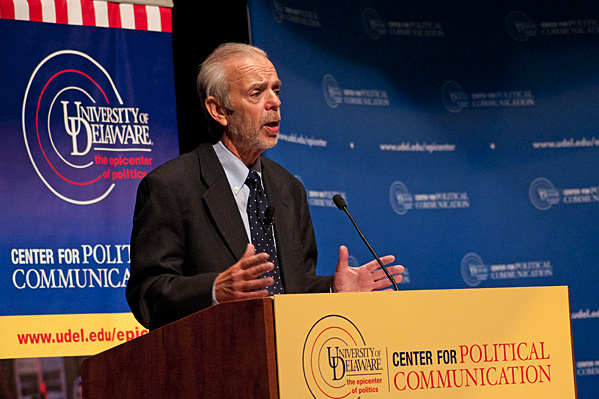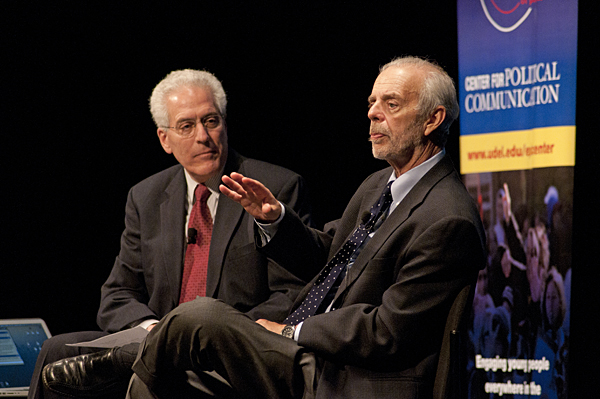International viewpoint
Public opinion expert Andrew Kohut discusses how the world sees America
3:27 p.m., March 24, 2011----Andrew Kohut, president of the Pew Research Center in Washington, D.C., and expert on public opinion, spoke about global views of U.S. leaders and politics on Wednesday, March 23, as part of the University of Delaware's Global Agenda series, sponsored by the Center for Political Communication.
The lecture, which was titled “Global Attitudes, Changes Since 9/11,” detailed multinational surveys focusing on worldwide issues, called the Pew Global Attitudes Project. The Pew Research Center is a nonprofit research organization that studies attitudes toward a variety of political and media issues in countries throughout the world.
Global Stories
Fulbright awards
Peace Corps plans
Kohut and the center have polled on economic issues, public well-being and social values, including more than 240,000 interviews in 57 countries.
“All things considered, we were most famous or we probably still are most famous for chronicling the rise of anti-Americanism during the Bush years,” he said. “Now we've been documenting how America's global image has changed in Barack Obama's era,” an image that, he said, has improved.
In May of 2003 after the invasion of Iraq, positive feelings about the United States dropped throughout the world. This attitude was due, Kohut said, to the invasion of Iraq, which led the United States to be viewed as a threat to Islam. “There was not only loathing of the United States, there was fear of the United States in many countries over this period,” Kohut said.
When it comes to anti-Americanism, Kohut said he believes Muslims and other countries must be evaluated differently. “In Muslim countries, the 800-pound gorilla then and now is how the United States is seen as dealing with Israel and Palestine.” The war of terrorism, he said, was seen as America picking on Muslim countries. “Iraq drove this home to many Muslim countries around the world.”
There is, however, some better news in recent surveys, he said. “We saw a revival of the American image in many parts of the world reflecting confidence in Barack Obama.”
Throughout the world, favorable opinion grew to be similar to what it was at the beginning of the decade before President Bush took office. Confidence in Obama's abilities was also higher than confidence in Bush's. Even in Muslim countries, votes of confidence were higher for Obama than they had been for Bush. In 2010, U.S. opinions of Obama had dropped, but he remained popular in much of the world, with some sliding in Muslim countries.
In looking at basic gaps between the United States and the rest of the world, Individualism is defining. Many of us, Kohut said, believe success is based on personal achievements. “Our strength sets us apart but leads to problems in the way Americans relate to the world at various times,” he said, giving the example of international relationships. “As a consequence, Americans are often lethargic in dealing with global problems,” he said.
Another difference is that we feel we have a right to protect ourselves preemptively, which is not the case in many other countries. Americanization and globalization are other global concerns, Kohut said.
Some recent positive signs include a declining support for terrorism and improvement in U.S. approval numbers in the Middle East. “The Muslim world is not monolithic and is certainly not monolithically anti-American,” he said.
Even when the U.S. is not popular, the American work ethic is respected. “I think the most important thing is there's broad acceptance of Western ideals, American ideals of democracy and of the free market in most of the world,” he said. “We're not faulted for what we believe, we're faulted for what we've done.”
Kohut is the former president of the Gallup Organization, as well as the founder of Princeton Survey Research Associates. He is also a founding director of surveys for the Times Mirror Center.
Global Agenda is presented by the Center for Political Communication and sponsored by the Institute for Global Studies and the departments of Communication and Political Science and International Relations.
The series has announced a change in the next program, with Rajendra K. Pachauri, who chairs the Intergovernmental Panel on Climate Change, speaking. This talk, scheduled at 7:30 p.m., Wednesday, April 6, in Mitchell Hall, is presented with the Delaware Environmental Institute (DENIN), as part of its DENIN Dialogue series, the Center for Energy and Environmental Policy, the College of Agriculture and Natural Resources and the Center for Political Communication.
For a complete schedule of speakers in the Global Agenda 2011 series and links to podcasts of past speakers, visit the series website.
Article by Erica Cohen
Photos by Duane Perry













